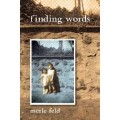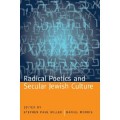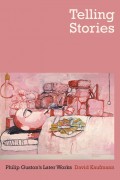Arts and Culture
Israeli Ghost Stories
“I’m having a love affair,” our cousin Motti confides, “with ghosts.”
Merle Feld Finds Her Words
Liturgy and family, awe and anger, these mixed ingredients produce a book best savoured in small bites.
Fiction: Girl's Night Out
The setting: Rosh Chodesh in the woods. Two long-time lovers, newly separated. A fire. And then, three men appear: “‘You shittin us. You witches! Look, there’s candles.’ He notices the tambourine, lying in the dirt.”
Lipstick on a Torah Scroll: A Review of the Zimmun Show
Israeli critic Sperber’s review illuminates the Jewish turn away from modernism towards a re-imagining of Judaica. He focuses on artists Dov Abramson, Ken Goldman and Arik Weiss.
Sarah Glidden's Israel
In Israel, the conflation of the personal and the political is unavoidable, where the simple fact of what neighborhood, city, or part of the country you live in has implications far beyond yourself.
“Certainly, the Jew is the Very Devil Incarnate”: Rethinking Antisemitism in the Merchant of Venice
The Merchant of Venice provides us with a psychological portrait not of the Jews, but of antisemites, whose hatred relieves them from guilt while simultaneously helping them achieve a selfish goal.
What Have I in Common with Jews? A Review of Radical Poetics
Kafka asks, What have I in common with Jews? I have hardly anything in common with myself!” This thought guides the essays collected in Radical Poetics, a new anthology by Stephen Paul Miller and Daniel Morris.
Poem: Disgrace
Daniel Morris, Radical Poetics co-editor, offers Zeek an example of radical poetics.
Poem: THERE’S ONLY ONE GOD AND YOU’RE NOT IT
Radical Poetics co-editor Stephen Paul Miller offers Zeek an example of radical poetics.
Ginsberg's Kaddish
Bill Morgan’s new edition of Kaddish finally gives us a full picture of Ginsberg’s mother, to whom the poem is dedicated.
Fiction: Girl's Night Out
A rosh chodesh turns dark when three men break into their campsite and accuse them of witchcraft.
Klutzy Klezmer: Zeek's First Klezmer Liner Note Contest
Bad spelling, weird mashups, yutz yiddish–can you beat klezmer musicians at their own game?
Intellectual in Translation: An Interview with Ilan Stavans
Can an Ashkenazi edit a Sephardi anthology? Are there Jewish public intellectual role models today? What should be the role of identity politics?
New Translations: Genesis
Jill Nathanson explores and updates the tradition of color-based abstraction, while experimenting with the abstract elements within Jewish thought.
Fiction: Next to the Traffic Signal, Under the Streetlight
A new diaspora of Israelis living abroad has taken Hebrew literature far from the concerns of the State. In this short story, paranoia and coincidence turn an encounter between an Israeli businessman and an elderly gentlemen on Parisian streets into a meeting with the uncanny. –Adam Rovner, Hebrew translations editor
Before Derrida: Salomon Maimon
A founder of post-Kantian German Idealism; a predecessor of French post-structuralism; a guy who thought he could become invisible–meet Salomon Maimon.
Food, Glorious Food!
My mother had taken the deer roast out of the freezer; my brother Ed was on his way over with some squirrels for my mother to fry up….
Review, "Telling Stories: Philip Guston's Later Works"
Aaron Rosen reviews David Kaufmann’s new book, Telling Stories: Philip Guston’s Later Works (University of California, 2010).
Israel's Eastward Beating Heart (Review)
Philip Hollander reviews Amy Horowitz’s Mediterranean Israeli Music and the Politics of the Aesthetic (Wayne State University, 2010).
"Gurion's Escape": an excerpt from "The Instructions"
Zeek has an excerpt of Adam Levin’s novel, The Instructions, which tells the story of young Gurion ben-Judah Maccabee, scholar at Aptakisic alternative junior high.
![[the current issue of ZEEK]](../../../image/2/100/0/5/uploads/leftistethicistgraphic-52842c6a.png)
- 5000 Pages of Zeek
- Founded in 2001, Zeek was the first Jewish online magazine, and we have over 5000 pages online to prove it, all available free of charge. Read more in the Archive.












